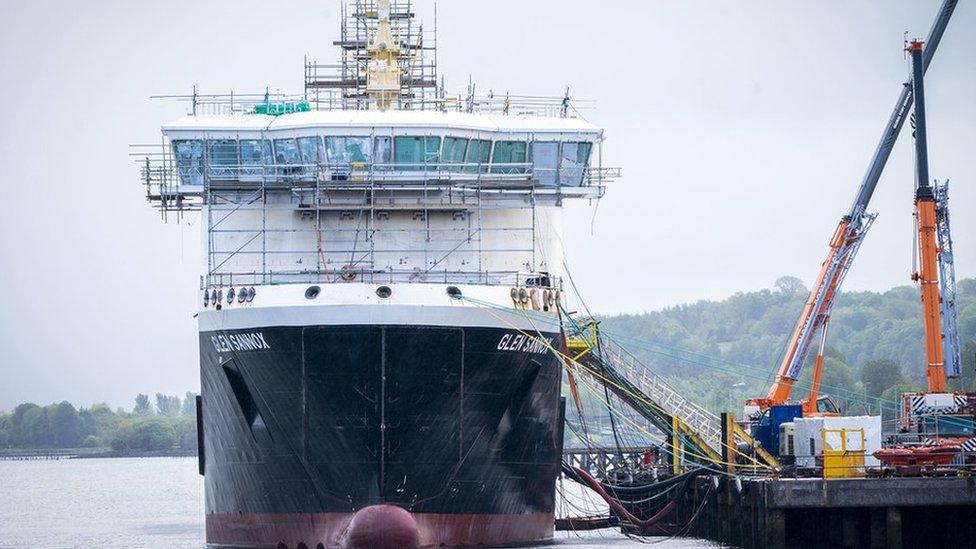Ferries Scandal: Shipyard takeover 'wasted' £200m of public money
- Published
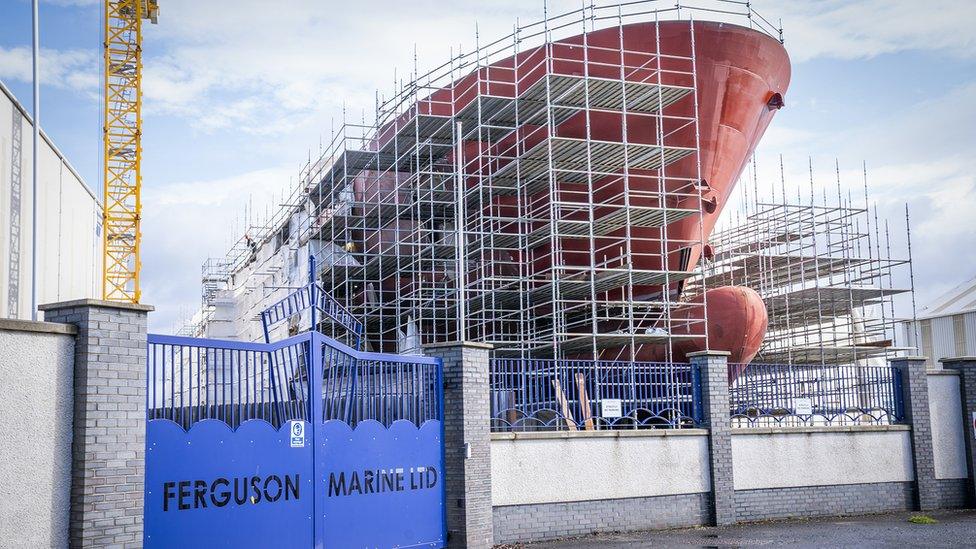
Glen Sannox and hull 802, pictured, are still being constructed at Ferguson shipyard
Former Ferguson boss Jim McColl has claimed ministers wasted £200m by rejecting an offer to end the impasse over two CalMac ferries.
Mr McColl revealed details of a proposal he made in 2019 to split the cost of finishing the ships, and limit the government's contribution to £50m.
Instead the shipyard was nationalised and the bill for completing the vessels has since risen by about £240m.
The government said Mr McColl's proposal breached EU state aid rules.
Mr McColl gave details of the offer, including legal advice that it was compliant with EU rules, in his latest submission, external to an inquiry by MSPs on Holyrood's public audit committee.
The offer was made in the spring of 2019 when relations between Mr McColl's company Ferguson Marine Engineering Ltd (FMEL) and government ferries agency CMAL had completely broken down.
At the time he believed FMEL was poised to win a share of a lucrative MoD order for Type 31 frigates, and was anxious to get the troubled ferries completed so he could move on with plans to develop and expand the Port Glasgow shipyard.

Jim McColl, left, was once an economic adviser to Nicola Sturgeon but has become a staunch critic
First Minister Nicola Sturgeon has previously told the MSPs that McColl's last-ditch offer was "rigorously assessed" but could not be considered for "a range of state aid and legal procurement issues".
He has now contested that, writing: "If the government had received an independent opinion confirming it was legal, and accepted the proposal it would have saved at least £200 million of taxpayers money.
"The claim by the FM that the proposal was 'rigorously assessed' needs to be probed and evidenced."
FMEL had won the £97m contract to build the ferries Glen Sannox and the still-unnamed hull 802 in 2015, just a year after Mr McColl had rescued the shipyard from administration in the weeks ahead of the 2014 independence referendum.
A recent BBC documentary presented evidence that the award of the contract may have been rigged in FMEL's favour - a claim disputed by government ferries agency CMAL which oversaw the procurement.
Ms Sturgeon also said she "completely and utterly" refuted claims of political interference in the contract award, when she appeared before the audit committee earlier this month.
Relations between FMEL and CMAL quickly soured, and the build ran into trouble. The ships are still being constructed with delivery five years late and costing up to £240m more than originally agreed.
Mr McColl has claimed problems arose because of CMAL's poorly developed concept design and subsequent interference in the build, and was pressing for an "independent expert determination" of the merits of his claim for extra costs.
CMAL argued it was a "design and build" contract and there was no legal basis for paying more than £97m.
After Jim McColl's last ditch offer was rejected, FMEL went into administration in August 2019 and was subsequently nationalised.
Within weeks, the Babcock-led consortium of which FMEL had been a member, won a £1.25bn contract to build five Type 31 frigates for the Royal Navy, but as FMEL was no longer in the running, the first ship has ended up being built entirely at Rosyth.
A government spokesperson said the first minister stood by her evidence.
"The Scottish government's priorities have always been the completion of the two ferries, securing a future for the yard and its workforce, and supporting our island communities that rely on this type of vessel on a daily basis," they added.
Separately, Keith Brown - who was transport minister at the start of the ferries procurement - has declined to give further detail in his evidence to the public audit committee.
Earlier this month convener Richard Leonard expressed surprise that Mr Brown had written only a 150-word letter in reply to MSPs' questions about his role.
Mr Brown has now written back to say he believes his responses were accurate and he has nothing further to add.

What was McColl's last ditch offer?
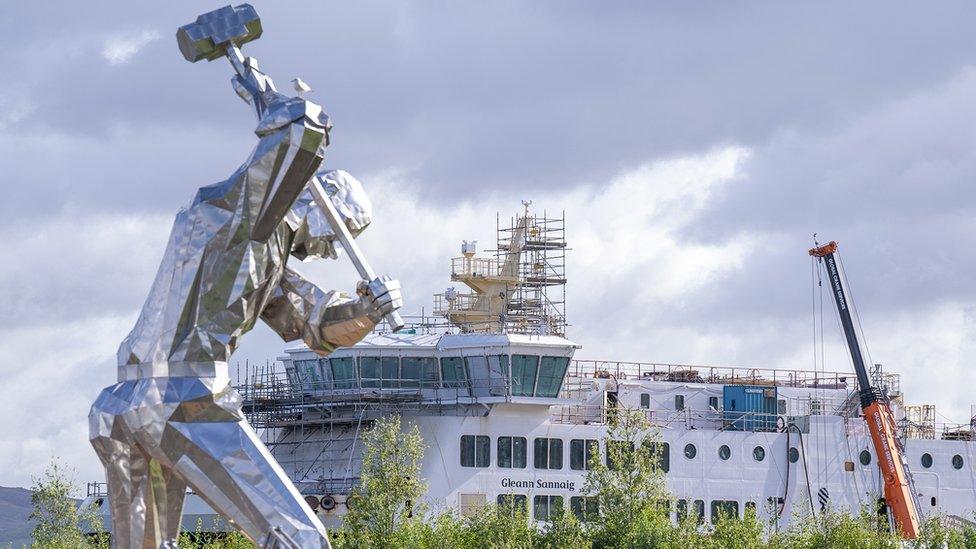
In the spring of 2019 work on the ill-fated CalMac ferries had ground almost to a halt as FMEL ran out of money and its claims for extra costs were repeatedly rejected.
FMEL and government ferries agency CMAL were at loggerheads. Jim McColl has told the BBC that at one meeting aimed at bringing the two sides together, he kept count of how many times CMAL's chairman used the phrase: "Then sue us". His tally came to 12.
At the same time, McColl felt confident he was on the brink of winning a share of the Navy's Type 31 frigate order. Litigation could have taken years, and he was anxious to get the ferries off the books, so FMEL's parent company Clyde Blowers came up with a final offer.
Under the plan, the shipyard's assets - apart from the ferries contracts - would be transferred to a new company called Ferguson Marine Engineering Technology Company Ltd.
FMEL would continue to exist, and the government would invest a further £50m into it, meaning it would own 95% of FMEL. Work on completing the ferries would then be subcontracted to FMEL, allowing the new company to get on with other business.
In July 2019, however, two senior civil servants advised economy secretary Derek Mackay that there were too many problems, external with the Clyde Blowers proposal - not least that it could be in breach of EU state aid rules. Government consultants backed up that view. , external
The offer was rejected, FMEL went bust - and by the end of the year the Ferguson shipyard was owned by the Scottish government.
Related topics
- Published23 November 2022
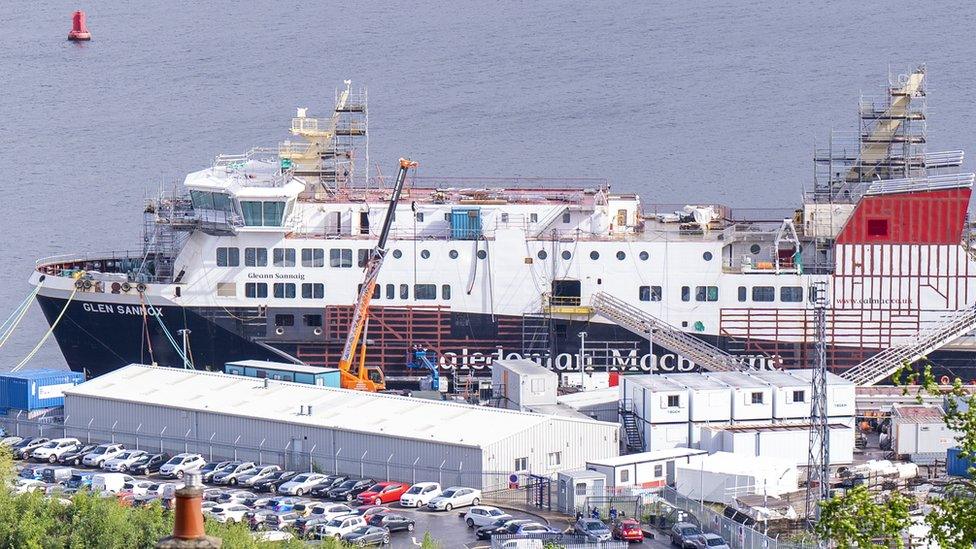
- Published4 November 2022
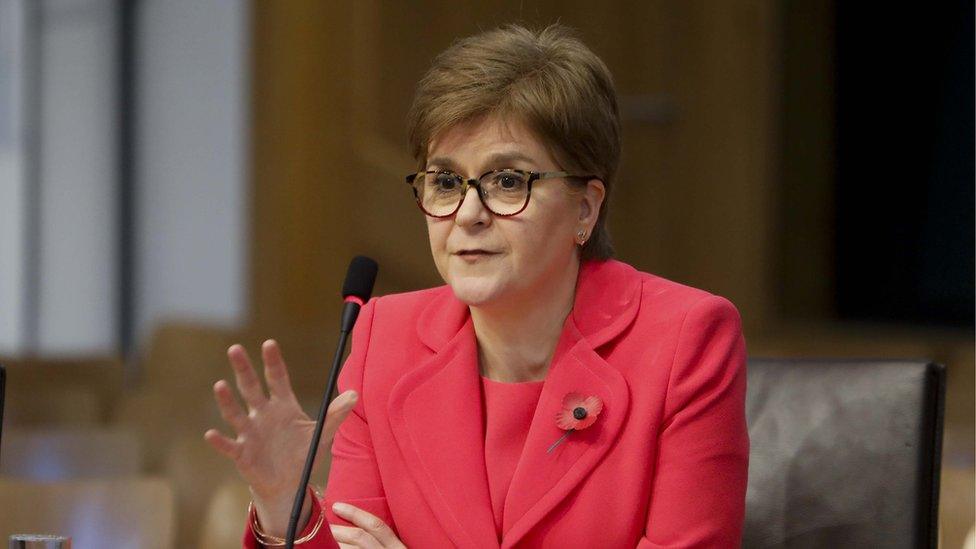
- Published27 September 2022
